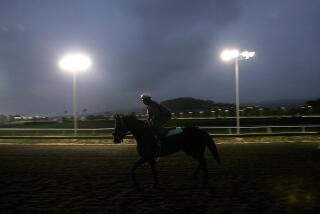Review: ‘The Last Race’ is a full-throttle portrait of stock car racing
- Share via
“The Last Race” is a high art film about a blue-collar subject, and that unlooked-for ability to see beauty in the everyday is what makes it both a surprise and a success.
That subject would be stock car racing, a salt-of-the-earth endeavor that made its first appearance on New York’s Long Island in 1927.
Once upon a time there were as many as 40 stock car tracks on the island, but now only a single one remains, Riverhead Raceway in Riverhead. This documentary is an impressionistic, atmospheric examination of a sport and a way of life that feel perilously close to extinction.
Director Michael Dweck, a photographer who’s been a fan of stock car racing since childhood, had been shooting stills at the track for five years when he got the idea for a documentary, and he enlisted Gregory Kershaw as both cinematographer and co-producer.
From “The Last Race’s” opening shots of wrecked racers, it’s clear we are in the presence of filmmakers with an impeccable eye, individuals who know that no shot is too random to be artfully composed.
That goes for the film’s racing footage as well, persuasively edited by Charlotte Munch Bengtsen, a Dane with no previous stock car interest whose best-known credit, Joshua Oppenheimer’s “The Act of Killing,” couldn’t be more different from this.
Captured by small, lightweight cameras attached to the cars, the footage is sometimes projected in slow motion, sometimes held longer than expected. Overall, it manages to be quite magical, enabling us to feel why stock car drivers and devotees are so passionately attached to their sport.
Just as important as the visuals here are the interviews shot with key players as well as candid dramatic moments captured on the fly. All of it is presented with the purpose of illuminating life on the inside of an endeavor where, as the filmmakers note, regular guys can become heroes.
So we meet drivers who talk about proudly following in their father’s footsteps, announce they’ve “been in love with muscle cars since I was a kid” and work obsessively on their cars in home garages while holding down day jobs that include, in one case, exterminating yellow jackets for a company called “Jim’s Busy Bee.”
The people we spend the most time with are the track’s 87-year-old owners, Barbara and Jim Cromarty, who still love the place they’ve run for 37 years but are feeling pressure to retire.
“When work is all you’ve known,” Barbara says in one of the film’s many unforced but intimate moments, “to give it up is a tremendous decision.”
One of the factors the Cromartys are weighing, real estate brokers let us know, is how valuable the land the track sits on has become. Surrounded by huge shopping centers on every side, it is likely worth $10 million, a sum too sizable to ignore.
In addition to its more or less formal interviews, “Last Race” uses audio to capture the feeling of the track, like listening in as the announcer excitedly talks about competitors like “Paul ‘The Pistol’ Parisi” and “17-year-old leadfoot Jack Handley Jr., ‘the Jack Attack.’”
The racing cars on display are often dented and damaged, a tribute to on-track collisions in a sport without a lot of politeness where competitors are shown roundly cursing one another and getting into fistfights for no apparent reason.
“We don’t look good, but we like to go fast,” one driver says, summing it all up, a fitting tribute to a proud but imperiled subculture and the surprising film that wants to ensure it is not forgotten.
-----------
‘The Last Race’
Not rated
Running time: 1 hour, 15 minutes
Playing: Laemmle’s Monica, Santa Monica
More to Read
Only good movies
Get the Indie Focus newsletter, Mark Olsen's weekly guide to the world of cinema.
You may occasionally receive promotional content from the Los Angeles Times.











